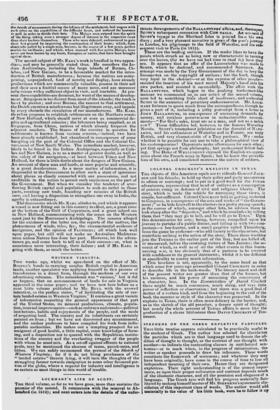LOCKHART'S LIFE OF SCOTT.
THE third volume, so far as we have gone, more than sustains the promise of the second. It commences with the removal to Ab- botsford (in 1812); and next enters into the details of the unfor- tUttate derangements of the BALLANTYNZe affairs, and, thereupon, Scovis subsequent connexion with Con•TABLE. An ammot Scores Voyage to the Shetland Isles is printed fro a his own diary ; and a very pleasant narrative is given of the poet's journey to London, his pilgrimage to the field of Waterloo, and his sob. sequent visit to Paris (in 1815). These are the leading outlines. If the reader likes to have the points which struck us as being new or characteristic in turning over the leaves, (for we have not had time to read it,) here they are. It appears that an offer of' the Laureateship was made to Scorn, which he declined, and recommended SOUTHEY. An attempt was made by the Tory Government of the day to levy the Income-tax on the copyright of authors ; but the &ire], though very loyal in the abstract—or at the expense of other people— resisted the insertion of his most sacred Majesty's baud into his own pocket, and resisted it successfully. The affair with the BALLANTYNES, which began in the pushing tradesman-like manner we commented on,in our notice of the second volume, soon led to something little short of insolvency, and embroiled SCOTT in the anxieties of pecuniary embarrassment. Mr. Locic.. HART forbears to quote much from the correspondence, though ho gives a part of it, including a pithy postscript from a letter to JOHN BALLANTYNE, in consequence of unceasing demands for money, and reckless perseverance in unbusinesslike conceal- ments—" For God's sake, treat me as a man, and not as a mach cow 1" These difficulties led, however, to the famous Waverley Novels. Scores triumphant jubilation on the downthl of Nseo- LEON, and his enthusiasm at Waterloo and in France, are truly British, and very characteristic of a Tory partisan. We %%cinder whether it be possible for any one to take a philosophical view of his contemporaries? Opponents make allowances for each other ; yet that springs not from philosophy, but professional fellow feel- ing. The Duke of WELLINGTON exposed the English exaggera- tions about the French army in Spain; but lie knew the peccadil- loes of his own, and considered moreover the nature of soldiers.


























 Previous page
Previous page